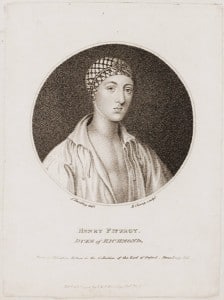 On this day in 1536 (some sources say 23rd), seventeen year-old Henry Fitzroy, Duke of Richmond and Somerset, died at St James’s Palace. It is thought that he died of some kind of pulmonary infection, such as tuberculosis (consumption). Fitzroy was the illegitimate son, and only son at this point, of Henry VIII. His mother was Elizabeth (Bessie) Blount.
On this day in 1536 (some sources say 23rd), seventeen year-old Henry Fitzroy, Duke of Richmond and Somerset, died at St James’s Palace. It is thought that he died of some kind of pulmonary infection, such as tuberculosis (consumption). Fitzroy was the illegitimate son, and only son at this point, of Henry VIII. His mother was Elizabeth (Bessie) Blount.
Henry VIII left his son’s burial arrangements to Thomas Howard, 3rd Duke of Norfolk, Fitzroy’s father-in-law, and Norfolk arranged for Fitzroy to be buried at Thetford Priory in Norfolk. Fitzroy’s remains were later moved to St Michael’s Church in Framlingham, Suffolk, due to the dissolution of the priory, and joined there by his wife, Mary Howard, after her death in 1557.
Fitzroy had been well enough to attend Anne Boleyn’s execution on 19th May 1536 and the first mention of his ill-health apears to be in a letter from Eustace Chapuys, the imperial ambassador, to Charles V on 8 July 1536. Chapuys wrote “the duke of Richmond, who, in the judgment of physicians is consumptive (tysique), and incurable”.1
Click here to read a short bio of him. If you want to read more about him then I would recommend Beverley A. Murphy’s Bastard Prince: Henry VIII’s Lost Son
Notes and Sources
- LP xi. 40